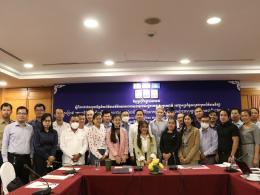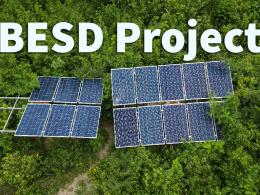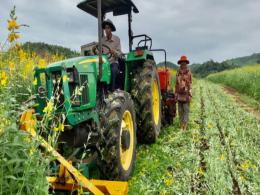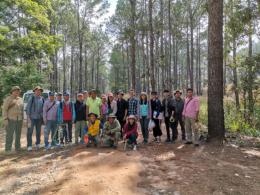Sustainable Financing for Climate Change through Community Forestry in the Prey Lang Landscape
Background
Climate impacts have severe consequences on the livelihoods of the majority rural population, which relies largely on subsistence fishing and farming, forming a critical foundation of its economic growth. Cambodia’s Climate Change Strategic Plan (CCCSP) (2014-2023) envisions building resilience, capacity, and production, especially at the community level, to effectively overcome climate change impacts. An increase in productivity in sectors such as agriculture, fisheries, livestock, and forestry, are among top priorities of the CCCSP. Furthermore, enhancing GHG emissions reduction from deforestation and forest degradation, enhancing forest ecosystems, and encouraging conservation and management of forest resources in a sustainable manner, are all pathways to low-carbon development, and are key pillars of the CCCSP. Community Forestry (CF) or community-based forest management is a legally recognized system in Cambodia that aims to place local people at the center of decision-making processes and natural resource management. Given Cambodia’s CF legal context, abundant forest resources, and existing CF decentralized structure, CF is a natural entry point for climate change mitigation and adaptation (CCMA) activities.
Overall Objective
Adapt and mitigate climate change by enhancing Cambodia’s most vulnerable citizens become more resilient to climate shocks and improve the ability of landscapes
Specific Objectives
1. Facilitate target CFs to review and revise CFMP Annual Operational Plans to incorporate climate change adaptation and mitigation;
2. Help communities identify indicative climate-sensitive forest conservation and restoration activities and integrate into planning;
3. Strengthen the capacity of existing CF credit groups to generate more financial resources to support forest conservation activities; and
4. Monitor and document the process and outcomes for larger national and regional level scaling.
Approach
The proposed project will work via CFs that are already established and organized, but have an inherently low adaptive capacity due to limited access to information, technology, and finances, coupled with a high dependence upon natural resources. These features are common among 3 CFs and make the people of CFs some of the most climate-vulnerable populations in Cambodia. With local Forestry Administration (FA) officers and local authorities, RECOFTC will support ten CFs in Kampong Thom and Kratie provinces. The project team will help these CFs incorporate climate activities into Community Forest Management Plans (CFMPs), it will train them in how to implement those activities (if needed) and will then assist CFs as they establish and manage the CF credit schemes that will finance the activities outlined in the CFMPs. The target CFs cover roughly 6,059 ha of forest and include 1,434 families, for a total of 5,032 community members, of which, 2,275 are women.
Outputs and Key Activities
| Result | Key Activities |
|---|---|
|
|
Knowledge Products
• Case studies • Lessons learned and recommendations • Workshops and training manuals
| Timeframe | Total Budget | Partners | Location |
|---|---|---|---|
|
November 2020 – April 2022 |
USD 116,774 (From CCCA US$99,977) |
The Regional Community Forestry Training Center for Asia and the Pacific (RECOFTC) |
Kampong Thom and Kratie Provinces |






